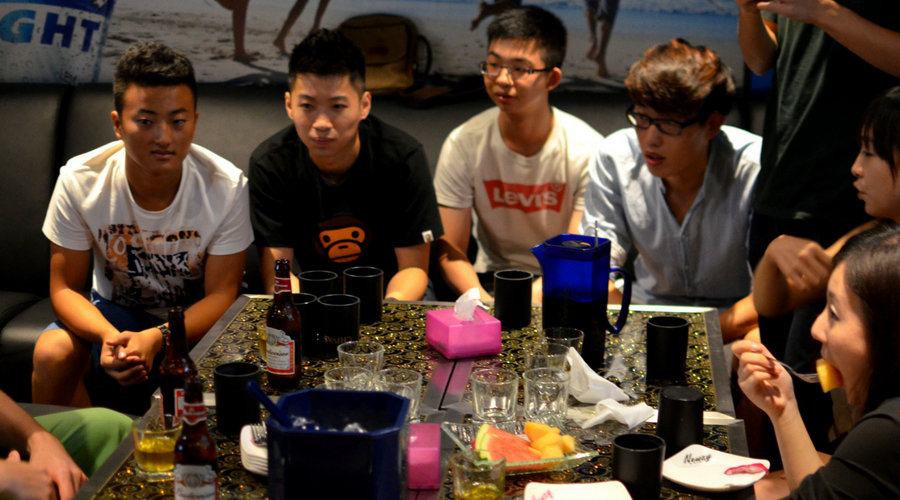7 Ways China Does Nightlife Differently

By Amy Wong and Louis Costenoble
The imagery of families living under strict regimes in a reserved and orderly manner do not fit well with the contrasted idea that most foreigners have of the international metropolis like Shanghai. So, they often finding themselves curious about the nightlife scene in China. Today, TGIF, Yufeng Mandarinedu has 7 main differences between the East and West in nightlife to present to y’all:
1) Partying must be done in your Sunday best

Shanghai has an eclectic mix of venues, but high-end bars are of the greatest abundance. After all, the city is best known for its luxury lifestyle, exemplified by its numerous skyscrapers and countless designer boutiques. This running theme of glitz and glamour extends into the nightlife scene where guest lists, cover charges, VIP events, bottle and table service are to be expected. And a night out in the big city calls for dressing to the nines. I’m afraid your best shirt won’t do compared to the Chinese, who rock immaculately crafted hairdos and ‘suit up’ without a crinkle in sight.
2) Sitting is the new dancing

If like me, you picture nightclubs as a large furniture-less dance floor full of young people swinging their hair and bodies to the beat, think again. My experiences so far have taught me that tables and booths take up maybe 80% of the entire club; yes, so much so that sometimes it can be hard to even pin point the dance floor!
3) You must drink and dice

The majority of patrons have not come here to just dance, but to sit, drink, snack and most importantly, socialize by playing games. Drinking games, or 酒令jiǔlìng in Chinese, typically involve dice or hands, and are a popular past time. Sitting with friends at a round table (symbolizing ‘unity’ from the phrase: 团圆tuán yuán, meaning united and round) is the main form of entertainment. Don’t be afraid to join them too. In fact, wealthy Chinese people often take great pleasure in inviting foreigners to join their table and enforcing copious amounts of whiskey onto them!
4) Don’t be deceived by the small glasses

Chinese people love tiny glasses, be it tea or alcohol. Popular drink choices are白酒báijiǔ, a strong Chinese liquor (around 40-60% alcohol), as are Western drinks like whiskey 威士忌wēishìjì and brandy 白兰地báilándì (notice the phonetically similar pronunciation compared to their English names). This can be compared with foreigners who mostly drink beer and mixers (though the Chinese often drink beer shots too!). As can be imagined, drinking liquor straight will set you up for an eventful night. Drinking to get drunk is commonly observed, the party does not stop until everyone has fainted/ passed out!
5) Smoke machines are not necessary

The familiar hissing sounds and strong smells of the smoke machines are replaced by actual smoke from cigarettes. Smoking indoors is not banned here, so that is something to get used to since there are many smokers in China. With disco balls, chandeliers, mechanical flashing lights and stages, the décor can sometimes pass off as gaudy rather than glamorous, so you can say that the smoke aids to mask that.
6) Nightclub or… entertainment hall?

The notoriously high prices charged for hiring tables can be justified for the entertainment value provided by the club. It is not uncommon to find female dancers in sparkling outfits singing or miming on stage. Sometimes there are even magic and fire performances throughout the night. Attendants will bring you your champagne in ice served alongside platters of freshly cut fruit, complete with sparklers and fog effects of course! Partying sure is an elaborate affair and it is safe to say the focus on going to a nightclub is not to dance and drink only, there is much more to it than that!
7) The 3 letters that change your night around: KTV

The majority of bars and clubs you find in China will play foreign, mostly English music. Despite the vast majority not understanding the meanings of these popular Western songs, Chinese people love to sing along to them. If KTV (karaoke) rooms aren’t joined to the club itself, do not fear as you are never far from a KTV joint in China. Karaoke/KTV is a cultural phenomenon and one in which you do not have to be musically gifted to enjoy. Often following a trip to a nightclub, Chinese people love to sing to their hearts content until the wee hours of the morning. It is usually sunrise by the time a Chinese night out finishes! While partying this hard might sound tough, keep in mind that a catnap in the corner is totally acceptable. And let’s not forget the street food, which is available at all hours and never far away from bars and KTV clubs.
Well there you go: 7 ways China does nightlife differently. While your usual routine of a night out may change and seem bizarre at first, it is not long before you find yourself getting used to it, joining in and partying like a local! 干杯gānbēi, ‘bottoms-up’ to that!
